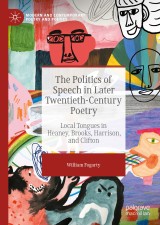Details

The Politics of Speech in Later Twentieth-Century Poetry
Local Tongues in Heaney, Brooks, Harrison, and CliftonModern and Contemporary Poetry and Poetics
|
128,39 € |
|
| Verlag: | Palgrave Macmillan |
| Format: | |
| Veröffentl.: | 30.07.2022 |
| ISBN/EAN: | 9783031078897 |
| Sprache: | englisch |
Dieses eBook enthält ein Wasserzeichen.
Beschreibungen
<p><i>The Politics of Speech in Later Twentieth-Century Poetry: Local Tongues in Heaney, Brooks, Harrison, and Clifton</i> argues that local speech became a central facet of English-language poetry in the second half of the twentieth century. It is based on a key observation about four major poets from both sides of the Atlantic: Seamus Heaney, Gwendolyn Brooks, Tony Harrison, and Lucille Clifton all respond to societal crises by arranging, reproducing, and reconceiving their particular versions of local speech in poetic form. The book’s overarching claim is that “local tongues” in poetry have the capacity to bridge aesthetic and sociopolitical realms because nonstandard local speech declares its distinction from the status quo and binds people who have been subordinated by hierarchical social conditions, while harnessing those versions of speech into poetic structures can actively counter the very hierarchies that would degrade those languages. The diverse local tongues of these fourpoets marshaled into the forms of poetry situate them at once in literary tradition, in local contexts, and in prevailing social constructs.</p><br><p></p>
Chapter 1: Introduction: Local Tongues.- Chapter 2: Troubled Tongues: Seamus Heaney and the Political Poetics of Speech.- Chapter 3: The Gwendolynian Tongue: Gwendolyn Brooks’s Noncolloquial Local Speech.- Chapter 4: Tongue-Tied Fighting: Tony Harrison’s Linguistic Divisions.- Chapter 5: Mortal Tongues: Lucille Clifton’s Local-Speech Admonitions.- Chapter 6: Coda: The Twenty-First Century Local-Speech Poem.<br><ul> </ul>
<p><b>William Fogarty</b> is Assistant Professor of English at the University of Central Florida, USA.</p><br><p></p>
<i>The Politics of Speech in Later Twentieth-Century Poetry: Local Tongues in Heaney, Brooks, Harrison, and Clifton</i> argues that local speech became a central facet of English-language poetry in the second half of the twentieth century. It is based on a key observation about four major poets from both sides of the Atlantic: Seamus Heaney, Gwendolyn Brooks, Tony Harrison, and Lucille Clifton all respond to societal crises by arranging, reproducing, and reconceiving their particular versions of local speech in poetic form. The book’s overarching claim is that “local tongues” in poetry have the capacity to bridge aesthetic and sociopolitical realms because nonstandard local speech declares its distinction from the status quo and binds people who have been subordinated by hierarchical social conditions, while harnessing those versions of speech into poetic structures can actively counter the very hierarchies that would degrade those languages. The diverse local tongues of these four poets marshaled into the forms of poetry situate them at once in literary tradition, in local contexts, and in prevailing social constructs.
Focuses on four major poets and their widely anthologized poems Argues that local speech is an elemental transnational facet of twentieth-century poetry Situates poems in literary tradition, in local contexts, and in prevailing social constructs
“This is a distinctive, highly original study. It presents a compelling discussion of poetic language and its aesthetic, emotional, and social functions, as enhanced by its reliance on elements of nonstandard local variants of speech. It has the potential to be a significant contribution to current poetics, namely the study of the ethical and social relevance of poetic language, and the debate on register, multilingualism and postcolonial agendas in poetry. By way of an intense and ethically-considered analysis of works by four twentieth-century Anglophone poets it demonstrates how they incorporate diverse demotic, tribal, dialectal, historical, and local forms of their civic and poetic language in order to address ethical, social, and creative issues. The study persuasively argues how this linguistic creative mechanism of reliance on variously defined and often multiple concept of ‘local speech’ is prevalent in contemporary and near-contemporary poetry and has fundamental ethical andontological consequences.” (Daniela Theinová, Senior Lecturer, Charles University, Czech Republic)
Diese Produkte könnten Sie auch interessieren:

The Enigma of Good and Evil: The Moral Sentiment in Literature

von: Anna-Teresa Tymieniecka

309,23 €















